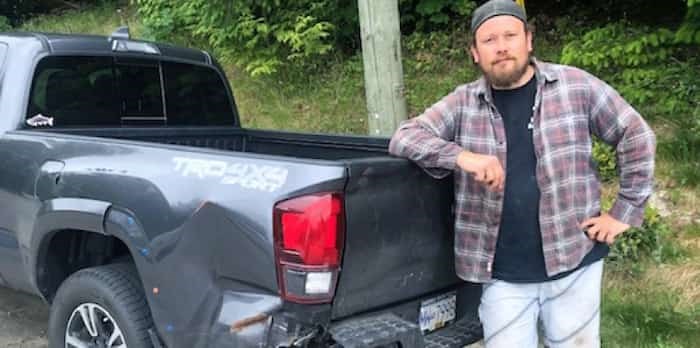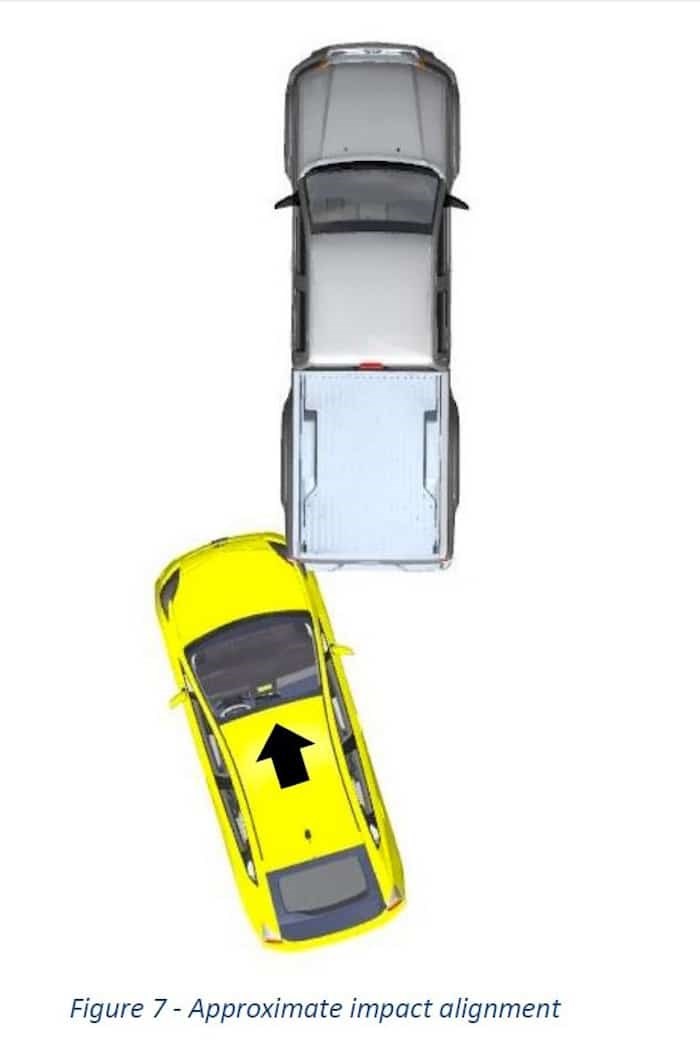 ICBC complaint Willis Clarke, a Sunshine Coast carpenter raised in New Westminster, poses beside his pickup, which was rear-ended by a taxi on Highway 1in Burnaby in March. Clarke is fighting ICBC’s 50-50 blame assessment. Photograph By CONTRIBUTED
ICBC complaint Willis Clarke, a Sunshine Coast carpenter raised in New Westminster, poses beside his pickup, which was rear-ended by a taxi on Highway 1in Burnaby in March. Clarke is fighting ICBC’s 50-50 blame assessment. Photograph By CONTRIBUTED
A 28-year-old driver who paid $3,000 for a forensic engineering report to prove a rear-end collision with a taxi in Burnaby wasn’t his fault has successfully battled ICBC’s blame assessment.
Willis Clarke was driving his Toyota Tacoma pickup east in the fast lane by the Douglas Road overpass near the end of rush hour on a dark, sleety evening on March 6 at about 6:30 p.m., when he saw a taxi behind him swerving to get into the HOV lane.
Clarke said the cab rear-ended him when he had to hit the brakes because cars ahead of him slowed down.
“He was super apologetic,” Clarke said of the cab driver.
Two weeks later, though, he found out the man had told ICBC it was Clarke who had swerved in front of him, and Clarke was assessed with 50 per cent of the blame.
Clarke appealed, but his appeal was denied, so he asked ICBC to have a forensic engineer examine the damage.
He said ICBC told him there was not enough damage to justify the expense and also that the only thing a forensic engineer could determine was that the vehicles were going in the same direction.
Forensic engineer
Craig Luker, a 25-year forensic engineer who has worked on more than 2,000 crash investigations – including for ICBC – said that’s just not so.
“The reality is, when you look at the nuance of the damage, sometimes you can tell things that you wouldn’t have foreseen being able to determine,” Luker told the NOW. “Sometimes you can see that a particular bracket is bent in a particular direction, say outboard and to the left, and, if that’s the case, then it tells you that there’s a force that came from inboard and to the right."
 An illustration from a forensic engineering report shows the approximate impact alignment of Clarke’s pickup and the taxi that rear-ended him. – Contributed by Willis Clarke
An illustration from a forensic engineering report shows the approximate impact alignment of Clarke’s pickup and the taxi that rear-ended him. – Contributed by Willis Clarke
Luker has acted as a court-qualified expert in U.S. Federal Court, the Superior Court of Washington State and the Supreme and Provincial Courts of British Columbia.
Clarke, with help from his dad, Brad Clarke, paid the engineer's Richmond company, Luker Forensic Engineering, nearly $3,000 for a report on the crash.
It concluded Clarke’s account of the collision was the more likely.
“The physical evidence is consistent with the version of events that the taxi struck the rear of the pickup truck while the pickup was travelling straight and while the taxi was overtaking it and performing a lane change to the left,” states the report, obtained by the NOW. “That manoeuvre would cause the forward and left damage on the pickup as well as the rearward and right damage on the taxi.”
The Clarkes told ICBC about the findings of Luker’s report but said they wouldn’t give the insurance company a copy until it agreed to cover the costs if the findings proved to be conclusive.
“We were cautioned that ICBC, after looking at the report, could change fault, and we would still be left with the bill,” said Brad Clarke.
ICBC passed their proposal around among several managers, he said, and it was only after father and son threatened to take the story to the media that the auto insurer agreed to pay for the report.
ICBC got the report on May 15, according to the Clarkes, but still hadn’t made a decision a week-and-a-half later.
'Endless runaround'
Brad Clarke described the process as an “endless runaround,” but he and his son were ready to take the matter to court – even though they money they had already spent was more than Clarke would have paid for accepting 50 per cent of the blame.
“It’s principle. I’m not a liar. I don’t think this taxi driver should get away with lying,” Clarke said.
After questions from the NOW on Friday, however, ICBC reached out to Clarke Monday to say the insurance company had assessed the taxi driver with 100 per cent of the blame and that Clarke would be reimbursed for the engineering report.
ICBC’s in-house engineer had been on vacation, a company representative explained in a voicemail, according to Clarke.
After the engineer looked over the report, ICBC reassessed the claim.
“I’m glad this is over with,” Clarke said.
Spokesperson Joanna Linsangan told the NOW ICBC takes “a fair and balanced approach to assessing claims” and considers all objective information available.
The insurance company had initially assessed 50-50 blame in Clarke’s case, she said, because it had “no definitive evidence one way or the other.”
She said such claims are rare and that 95 per cent of claims end in a 100-percent assessment to one party or the other.
She also said Clarke had been told on “multiple occasions” that he could have pursued a free claims assessment review by an independent arbitrator but that he had declined to do so.
But Clarke said he was never told about the claims assessment review process.
He believed he was out of options with ICBC, he said, or he wouldn’t have spent nearly $3,000 on the forensic investigation.
Clarke’s takeaway from the ordeal is clear.
“Don’t let ICBC bully you,” he said.
And, if you can, get your dad to help.
“They really only started doing stuff when my dad got involved,” Clarke said. “My dad said you need to have grey hair for them to do anything.”
This story has been updated from a previously published version to reflect new information about the case.



